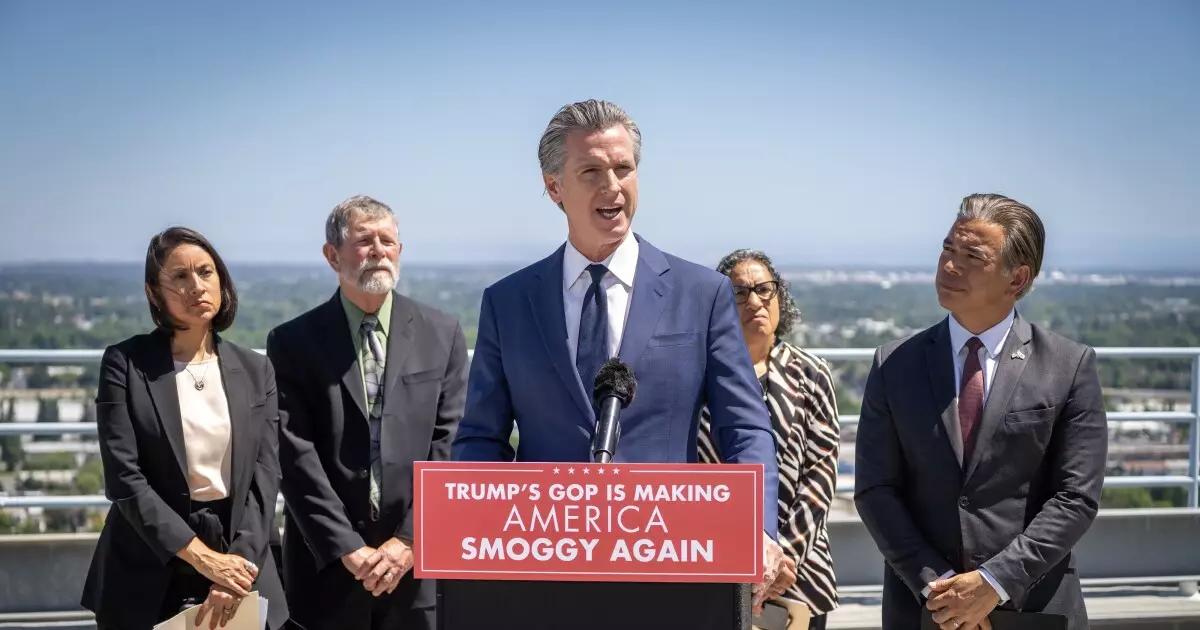In a high-stakes legal showdown, California is once again gearing up to take on the Trump administration. The state’s officials are set to file a lawsuit over recent congressional legislation that seeks to dismantle California’s stringent vehicle emission regulations. This proposed bill is not merely a policy shift; it epitomizes a broader struggle between state rights and federal authority. California’s regulations, already recognized as the most ambitious in the nation, are designed to phase out fossil fuel-powered vehicles by 2035. Yet, the administration’s effort to undermine such regulations reveals a fundamental misunderstanding of both environmental progress and economic imperatives.
Governor Gavin Newsom articulated the frustration felt by many Californians, stating that this move is not only shortsighted but downright illegal. The rhetoric from Newsom and California’s Attorney General Rob Bonta underscores an alarming trend: the prioritization of ideological polarization over sound environmental policy. This latest piece of legislation represents a dangerous attempt to stifle the progressive movement towards sustainability and public health.
Historical Context Behind Emission Standards
The argument forged by California does not rest solely on modern-day political games. For over five decades, California has been allowed to enforce air quality standards that surpass federal requirements. Historically, this was a bipartisan endeavor, with past Republican leaders like Nixon and Reagan recognizing the necessity of robust environmental safeguards. Now, contrastingly, the Trump administration’s actions signal a departure from this so-called consensus. Interestingly, it paints a picture where the GOP has seemingly abandoned its own legacy of environmentalism, choosing instead an approach that panders to fossil fuel interests.
The state has received over 100 waivers from the Environmental Protection Agency since the inception of the Clean Air Act in 1970. Recently, however, Senate Republicans have disregarded such precedents in favor of a quick political win, raising questions about their commitment to long-term solutions. This maneuver is seen as a direct adversarial attack on a state’s rights to enact necessary measures to protect its citizens.
The Threat of Regression
This confrontation is not just about emission standards; it’s about the broader implications for public health and environmental justice. California is home to five of the nation’s ten cities with the worst air quality, leading to alarming health statistics. Millions of residents face deteriorating conditions, with high rates of respiratory diseases directly tied to air pollution. The decision to weaken California’s regulations will have far-reaching effects, prolonging the suffering of these communities and stalling economic opportunities associated with clean technologies.
Newsom’s bold proclamation that the Trump administration is making America “smoggy again” reflects a genuine fear that environmental progress will be lost in the name of political expediency. This isn’t just a political battle; it’s a moral one that challenges future generations’ ability to breathe clean air and live in an unpolluted environment.
Global Ambitions at Stake
Furthermore, this legal tussle has international ramifications. California aims to be a leader in electric vehicle (EV) manufacturing, which stakes the state’s economic future against competitors, such as China, who are rapidly advancing in this arena. The Trump administration’s rollback of emission regulations potentially undermines essential innovations within the domestic automotive industry, leading to a loss of competitiveness and a regression into dependence on outdated fossil fuel technologies.
As California pushes for cleaner energy solutions, it also highlights the opportunity for an economic boom spurred by the green technology sector. Companies making strides in electric mobility and sustainable solutions could face dire consequences if federal policies revert to business as usual, threatening innovation and economic growth in a critical industry.
This battle over emissions is symptomatic of a larger culture war, showcasing how partisan politics have reached into the realm of essential environmental policy. The implications of the California lawsuit stretch beyond legal frameworks; they touch people’s lives and the very air they breathe. The conversation must shift from red versus blue to a collaborative effort that prioritizes ecological sustainability and human health. As the Golden State stands firm, the question remains: will other states unite with California in this fight, or will they surrender to the whims of a politicized agenda that risks not only their environmental future but their economic viability as well?

